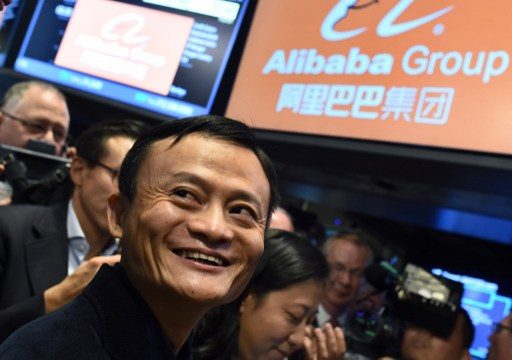SUMMARY
This is AI generated summarization, which may have errors. For context, always refer to the full article.

SHANGHAI, China (UPDATED) – Chinese e-commerce giant Alibaba saw revenues leap 59% year-on-year for the quarter ended in June, it said Thursday, August 11, its strongest growth since it listed on the New York Stock Exchange in 2014.
Revenue for the company, seen as a proxy for China’s increasingly crucial consumer sector, reached 32.15 billion yuan ($4.83 billion) in the June quarter, it said in a statement.
The total was well ahead of the 30.2 billion-yuan average of estimates compiled by Bloomberg News.
Alibaba is China’s dominant player in online commerce, with its Taobao platform estimated to hold more than 90% of the consumer-to-consumer market, and its Tmall platform is believed to have over half of business-to-consumer transactions. (READ: Alibaba to buy $1B controlling stake in Lazada)
But according to the company, net income plunged 77% year-on-year to $1.08 billion in the latest quarter – the first of its financial year.
Still, Alibaba’s chief financial officer Maggie Wu described the results as “excellent.”
“The 59% revenue growth for the company overall and the 49% revenue growth of our China retail marketplaces represent the highest growth rates we’ve achieved since our IPO,” she said in the statement.
The company’s gross merchandise volume (GMV) – a measure of value for online sales – rose 24% year-on-year to $126 billion in the June quarter, the statement said, matching the growth of the previous 3 months.
The company, often compared to eBay or Amazon of the United States, has expanded outside its core e-commerce business, in sectors ranging from sports to entertainment.
Alibaba ‘makes the rules’
In the June quarter, paying customers for Alibaba Cloud, its cloud computing unit, grew to 577,000, with the segment’s revenue booming by 156% year-on-year.
“The focus of its strategy is no longer (online) retail. It has moved to underlying services such as finance, cloud services, and logistics,” Li Chengdong, an independent e-commerce strategy analyst based in Beijing, told AFP.
“Alibaba is using the strategy of being a platform and ecosystem for others,” he said. “Alibaba makes all the rules and profits from those rules. That is what makes it a greater company than its peers.”
Hakon Helgesen, analyst at the research firm Conlumino, said the company showed “strong” performance in its home market but remains slow in fulfilling its global ambitions, with Chinese retail accounted for 73% of Alibaba revenues.
“Despite its success at home, Alibaba has struggled to gain traction in already established markets like the US,” Helgesen said in a research note.
“While this was once a stated ambition, and perhaps remains a long term goal, it is off the agenda for the short term. In our view this is correct: chasing lower margin, profit eroding international gains for the sake of vanity makes little sense.”
The analyst added that Alibaba was moving into some new markets in Asia “to focus on high growth markets where commerce is more embryonic.”
JD.com, a Chinese competitor of Alibaba, on Wednesday reported its net revenue for the second quarter increased 42% on the year to $9.8 billion, but it also registered a net loss for the period.
Alibaba is not without controversy. It has faced accusations over the sale of counterfeit goods on its platforms, which the company says it has sought to address.
In June, Alibaba founder Jack Ma said that unbranded goods were often better than the branded originals they imitate, drawing criticism from some industry groups.
“The problem is that the fake products today, they have better quality, a better price than the real product, than the real names,” Ma told investors.
Separately, the US stock market regulator has opened an investigation into Alibaba’s accounting practices, the company revealed in May.
The US Securities and Exchange Commission (SEC) had sought information into Alibaba’s accounting for its Cainiao logistics network and its reporting practices for Singles Day, a huge sales event in China.
Ma, who is also executive chairman, told state media in June that the company was assisting in the SEC probe. – Rappler.com
Add a comment
How does this make you feel?
There are no comments yet. Add your comment to start the conversation.